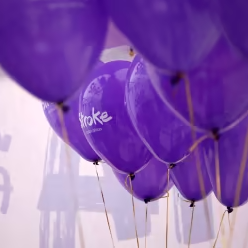Press release -
Nearly half of working age stroke survivors face financial hardship
New figures published today by the Stroke Association reveal that almost half (43%) of stroke survivors across the UK, aged under 65, are faced with financial hardship after their stroke. The charity’s findings reveal that more than 125,000 stroke survivors have experienced a loss of income, faced discrimination at work, and in some cases, have been forced to sell their home to pay for medical expenses.
The Stroke Association’s Lived Experience reportis the UK’s largest ever survey of people affected by stroke, with over 11,000 responses. The second chapter (of four), The wider impact of stroke, shows how the impact of the condition affects people’s working life, relationships and finances.
There are currently over 1.2 million stroke survivors in the UK, with a quarter of strokes happening to people of working age. The findings show the price tag that can come with a stroke, revealing that across the UK;
- Over half (51%) of stroke survivors aged under 65 gave up work or reduced their working hours following their stroke.
- Close to one in six (15%) of stroke survivors aged under 65 experienced discrimination, or missed out on a promotion, or said their employer was not supportive.
Bronagh Connolly is 46 and lives in Derry/Londonderry. Bronagh had a stroke in October 2018.
She remembers when the stroke happened: “When I woke up that morning, my arm and leg weren’t working properly, I thought it was Bell’s palsy and then I realised I couldn’t speak at all”.
Bronagh’s friend phoned her and knew there was something wrong and called for an ambulance. Bronagh then spent two and a half weeks in Altnigelvin Hospital and received speech and language therapy and occupational therapy.
The stroke had affected the right side of her body, but the physical effects only lasted days. Bronagh remembers how, in the weeks after the stroke, she couldn’t communicate. Bronagh says: “I could say the words yes and no but I’d use the wrong word at the wrong time. After my stroke, I knew what was going on and people would come to visit me but I just couldn’t speak to them.Eventually, by working with the speech therapist, I got my words back and everyday a few more would come back to me”.
Before her stroke Bronagh worked a typical 45 hour week as a pharmacist in Liam Bradley Pharmacy in Derry/Londonderry.
Bronagh says: “I was one of two pharmacists in a very busy but vibrant shop. I enjoyed it, it was great craic. Right after my stroke I couldn’t speak properly or read and understand letters.I had to ask my dad to take care of all my personal affairs, so returning to work was definitely off the table at that time.
“Another effect of the stroke was that I’d forgotten a lot of what I used to know.I found I couldn’t remember much of my pharmacy knowledge and training. This was a huge blow to me as I couldn’t imagine what I was going to do with my life next.
“I had some savings and that helped, it got me through until April this year (2019) but then the sick pay from work also ended. So I had to apply for welfare benefits. The net result was I was now living on about a third of what I used to earn.
“Because of the fatigue I now live with every day, I need to sleep after about four hours. I can’t go back to work living like that anyway. I’m not the same person I was before the stroke. I’m living a much smaller life. Before it was very full on. I loved my work, meeting people and going out. But after the stroke, I felt like a child. I had a different brain.
“I’ve had some good news recently though. I got my driving licence back on 6 July. I’m so happy about that.I celebrated by driving out to the beach with my two dogs so they could have a good run”.
Barry Macaulay, Director of the Stroke Association in Northern Ireland, said: “Life changes instantly after a stroke, and the condition can have a huge cost, not only to people’s finances, but also to their health, independence and relationships. But not enough people realise the wider impacts that stroke can bring. Overnight, a partner becomes a carer. A breadwinner becomes jobless”.
“These latest figures show that many stroke survivors are facing a life on the edge of poverty; many have had to give up work, and in some cases, face discrimination from their employers. This comes at a time when financial worries should be the last thing on their minds”.
The Lived Experience of Stroke report seeks to expose the realities of living with stroke. The charity wants everyone affected by stroke to have access to the support that they need, when they need it. The latest findings also show that:
- Nearly one in five (15%) of stroke survivors faced increased costs as a result of their stroke, which could include medication, aids and higher household bills due to being at home
- Sometimes stroke survivors even have to sell their homes to pay for medical expenses; across the whole UK stroke population this could be as many as 12,000(ii) people.
- Only one in 10 (10%) of stroke survivors had used a benefits or financial advice service.
Barry continues: “Recovery is tough, but with the right support and plenty of courage and determination, the brain can adapt. Time and again we’ve seen thousands of people like Bronagh, adapt to a new life after stroke; and we’ve helped them to adjust to a new normal. However, it is extremely worrying that not enough stroke survivors are receiving the support they need to either remain in work or access vital benefits. I’d like to see more people contacting our Helpline to help them through this difficult process.”
The Stroke Association spoke to stroke survivors, who offered advice for anyone who has found their work or finances impacted by their stroke. They advised:
- Before stroke happens, consider income protection insurance and critical illness cover. For those who have dependents, such as a partner or children, you might also consider life insurance.
- When returning to work, talk to your employer and agree reasonable adjustments to help you in the work place. This could be a phased return, part-time or adjusted hours, or a move to lighter duties.
- If you are an employer and an employee has had a stroke, learn about the condition to help you understand how it affects an individual. Ask your employee what they need as this will enable you to support them in the best way.
- A stroke can have a huge financial impact, stroke survivors need signposting to services or charities that offer financial support.
- Don’t be afraid to seek help – whether you are a stroke survivor or you know someone who has had a stroke.
Angela Matthews, Head of Policy & Advice at the Business Disability Forum, said: “Soon after a stroke, a survivor has to navigate how different their body feels, the changed pace at which their body needs to work, and learn to adjust to doing things in new ways. All of this often happens in the background while needing to return to work so that personal finances are affected as little as possible. Stroke survivors might not be able to return to the same job they did before, but they can sometimes return to some type of work, albeit different to what they used to do.
“The worrying 51 per cent who have given up work following a stroke means employers are losing valuable, experienced talent. There is also the wider policy concern that the disability employment gap is being increased, when stroke survivors are not being supported back to work by both the healthcare and workplace settings working together.”
The Wider Impact of Stroke report is part two of a four part series focusing on the Lived Experience of Stroke. For more information about the Lived Experience of Stroke – Wider Impact report, visit www.stroke.org.uk/livedexperience.
The Stroke Helpline (0303 3033 100) offers information and support to people who have been affected by stroke.











